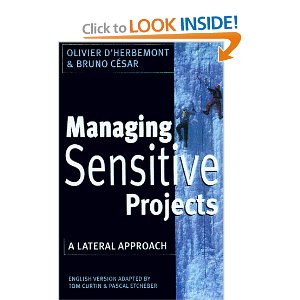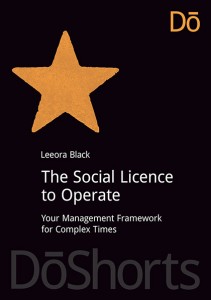Considering and understanding stakeholders and then acting to engage them is generally agreed as being one of the most critical parts of any managed change initiative.
Paper can be accessed here

Considering and understanding stakeholders and then acting to engage them is generally agreed as being one of the most critical parts of any managed change initiative.
Paper can be accessed here
Every day, managers must adapt to rapidly changing markets and situations. This book deals with sensitive or difficult projects. They range from redundancy programmes to disposal of radioactive waste, from the launch of a new product to the introduction of a new computer system. The method – the strategy of the lateral project – is radically different from those used in projects which are normally associated with traditional project management. It is based upon the lateral thinking concepts of Edward de Bono and is derived from 20 years experience of working with brave managers on projects which many others would have left to their successors. This is a revised translation of the prize-winning and best-selling French management book.
 Buy book here
Buy book here
 Buy book here
Buy book here
Selectors, LLC (“SELECTORS”) uses applied game theory tools that have proven their ability to assist decision-makers:
SELECTORS uses game theory on behalf of its clients to resolve specific business or political problems.
AREAS OF APPLICATION
The methodology SELECTORS uses applies to the wide range of issues where people endeavor to persuade or coerce others towards their favored outcome. Some typical areas of application are:
PREDICTING POLITICAL OUTCOMES
CORPORATE ADVISORY, M&A
LITIGATION SETTLEMENTS
LEGISLATION AND REGULATORY LOBBYING
NEGOTIATION WITH OVERSEAS GOVERNMENTS
It does not apply to predicting markets where outcomes are driven by supply and demand. The methodology is rigorous and external audits find it accurate 90 % of the time.
PRIMA helps executives and public officials manage high-impact risks and opportunities in socio-political systems in order to identify and influence stakeholder coalitions to influence public policy and corporate reputation.
Mission Statement
PRIMA identifies and quantifies high-impact risks and high-yield opportunities in complex sociopolitical and infrastructure systems. We provide our clients with actionable insights by analyzing vast quantities of data to identify the stakeholder positions with the greatest potential impact on financial performance or mission attainment.

Markets We Serve
PRIMA’s clients share a common concern: the profound impact that critical stakeholder coalitions or complex system interactions may have on financial performance or mission attainment. Whether the system in question is…
 a political system in which policymakers with different powers seek to accommodate organized interest groups with different priorities, or
a political system in which policymakers with different powers seek to accommodate organized interest groups with different priorities, or a social system in which organized interest groups attempt to shape the perceptions of ordinary consumers and voters
a social system in which organized interest groups attempt to shape the perceptions of ordinary consumers and votersPRIMA assists private executives and public officials by identifying the stakeholder coalitions or infrastructure system architectures toward which limited risk mitigation resources can be most effectively directed.
For more information, see presentation here
NB: Witold J. Henisz is a principal in PRIMA LLC
Stakeholders not happy? Can’t get people to work together? Use four simple steps and our proven templates to map your stakeholders. Learn how to analyse stakeholders by interest and influence to identify key players, potential saboteurs, advocates and avoid time wasters.
 Project management methodologies and organisations approach stakeholder mapping in different ways, but there are fundamental principles and processes that can be drawn out. I have distilled these principles into a proven 4 step process that can dramatically improve your chances of success.
Project management methodologies and organisations approach stakeholder mapping in different ways, but there are fundamental principles and processes that can be drawn out. I have distilled these principles into a proven 4 step process that can dramatically improve your chances of success.
ListenLogic is a pioneer of advanced social insight discovery, utilizing next-generation streaming big data technology to deliver actionable, real-time intelligence to the world’s largest enterprises.
ListenLogic Advanced Social Analytics delivers deep insight into consumer attitudes and needs by analyzing unstructured data from social media, open-end surveys and text documents. Our Risk & Reputation Monitoring detects reputational and operational risks that emerge from social media and internal data. Our Pharma & Health division, ListenLogic Health,specializes in providing brand and market intelligence to life science companies.
To see how ListenLogic can help your business contact us.
This case study series collects experiences with Net-Map from around the world and is intended to explore different applications and adaptations of the tool, inspire future users and initiate discussion and methodological development. Users who would like to contribute their own case study and share their lessons learned, are encouraged to contact Eva Schiffer at [email protected]
Dates: June 27-28th, time 9 am to 4 pm
Venue:
The George Washington University
Marvin Center: Room 403,
800 21st St, NW Washington, DC 20052
Places available: The course will be taught in a small group (around 14 people) with a focus on hands-on learning and peer exchange.
Certification: After completion of the 2 day training, each participant will apply Net-Map in their own context. On completion of a case study a Statement of Accomplishment or Certificate will be given.
Each participant is entitled to a free 2 hour phone/skype consultation with Dr. Schiffer within 6 months of the training, to discuss questions that came up with implementation.
Price: 500 dollars, 400 dollars for students
Refund policy: 80% refund within October 15th, 2013
You will learn how to use this pen-and-paper method in meetings, individual interviews and to structure your own thinking process. It will improve your project planning, monitoring and evaluation, team work and strategic networking.
From years of Net-Mapping experience, I have distilled the most common prototypical influence network structures, which I will share with you. This will help you detect network problems, bottlenecks and opportunities while you are mapping the network so that you can immediately develop improved networking strategies. By mapping out your own case studies (challenges from your work experience), you will learn the method, develop a networking plan for a complex work related issue and improve your “network eyes”.
Because the most difficult questions normally come up once you are back to your own work, wanting to implement what you have learned, we have added a free 2 hour phone or skype consultation, redeemable within 6 months after the training, to the package.
Have a look at the detailed program and sign up!
Net-Map is an interview-based mapping tool that helps people understand, visualize, discuss, and improve situations in which many different actors influence outcomes (Net-Map Brochure: 679 KB). By creating Influence Network Maps, individuals and groups can clarify their own view of a situation, foster discussion, and develop a strategic approach to their networking activities. More specifically, Net-Map helps players to determine
Determining linkages, levels of influence, and goals allows users to be more strategic about how they act in these complex situations. It helps users to answer questions such as: Do you need to strengthen the links to an influential potential supporter (high influence, same goals)? Do you have to be aware of an influential actor who doesn’t share your goals? Can increased networking help empower your dis-empowered beneficiaries?
The tool is low-tech and low-cost and can be used when working with rural community members with low formal education as well as with policy makers or international development actors.